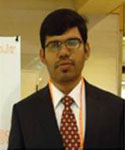
Prof. M. Mubarak Ali
Chikkaiah Naicker College, India
Title: Advanced Applications of Anodization in current scenario
Abstract:
In recent days, the anodization process is useful in both mechanical and biomedical applications. Even though these both may be different fields, the mixed applications of both may involve in bio implants are of significant importance such as corrosion resistance and mechanical properties. The metal implants are the best choice for the long-term replacement of hard tissue, such as hip and knee joints, because of their extra ordinary mechanical properties and other significances. Aluminium / Titanium and its alloys, due to their organized oxide layer by anodization, which protects the surface from corrosion and prevents ion release in this case which are widely accepted as biocompatible metal implants and for other industrial applications. However the problems those are connected to poor bio-compatibility, excessive rigidity and implant failures which are leading the researchers to investigate for smart bio-materials to rectify these difficulties. This work explains anodic oxidation and the manner by which nanotubes/ rods / wires form on the surface of the metals. It then assesses this topical research to indicate how changes in anodizing conditions which are influencing the characteristics of the materials such as tube diameters, nanotube-layer thickness etc and their applications. Usually metals are having biomechanical properties and other significant characteristics which are being very suitable for implanting process. However, these important metals characteristics which are also very flexible to carry out the process. The advancements of the materials which are using with time and low success rates with metals (Stainless steel and gold), these materials are now replaced by newer ones. Titanium (Ti) and its alloys have become the metals of choice for dental implants. However, prosthetic components are still using for its effectiveness and solidarity from these alloys. This work is dedicated to cover the applications and recent developments of bio implant which are leading to the human society in an executive way.
Biography:
Dr. M. Mubarak Ali is currently Assistant Professor of Chemistry at Chikkaiah Naicker College (Govt. Aided Institution), Erode-638 004, Tamil Nadu, India. He has taught a full range of graduate (Masters and Doctoral) courses in collegiate education. He received his Ph.D. in Chemistry (Materials Chemistry - plasma electrolytic oxidation) from Periyar University (2011); M.Sc. in Chemistry from Jamal Mohamed College, Bharathidasan University (2004); B.Sc. in Chemistry from Thiruvalluvar Govt. Arts College, Periyar University (2001). Before arriving at his present position, he was working as a Post Doctoral Research Associate at Yeungnam University, South Korea for 2 years (2011-2013), Assistant Professor of Chemistry and Assistant Professor of Chemistry (Arignar Anna Govt. Arts College, Vivekanandha College of Arts and Sciences for women, Trichengode, SSM College of Engineering (2004-2007). He has received the Senior Research Fellowship Award (by direct Interview) from CSIR (2011), India and UGC doctoral fellowship award (2007). Currently he is working in Anodization, polymer, nanocomposites, thin films for solar energy conversion and conducting polymers. He has been author of 3 books, published over 23 articles in international professional journals, and made over 60 presentations at professional conferences around the world. He has participated in workshops/ short term courses of more than 20 in various premier institutions like Indian Institute of Science, Bangalore, Central university of Hyderabad, IIT Bombay, Kanpur etc. Presently he is guiding five students for their Doctoral research work and two students for their MPhil studies. He has received best rotary president award and distinguish blood donor award during his graduate education. He has involved /organised so many social awareness programmes such as polio vaccination, child labour awareness, tree plantation etc.